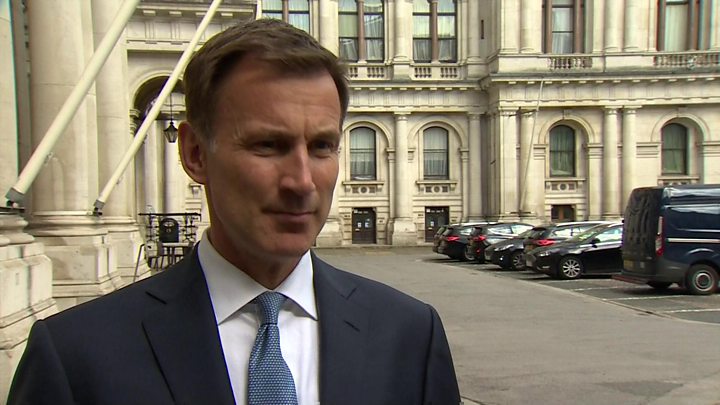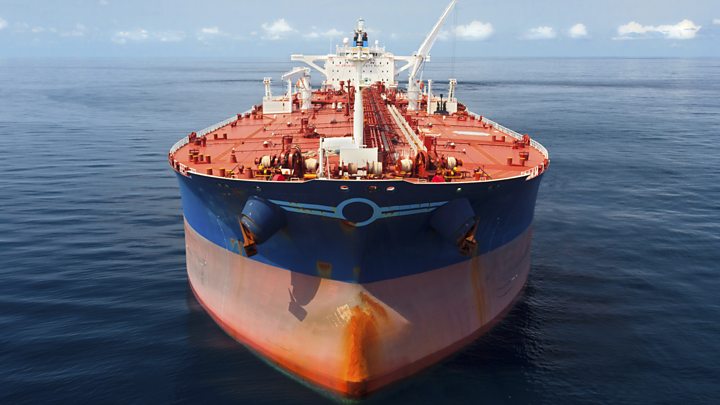Media playback is unsupported on your device
A recording has emerged of radio exchanges between a Royal Navy frigate and Iranian armed forces vessels, moments before a British-flagged oil tanker was seized in the Gulf.
In the recording, what is thought to be an Iranian vessel can be heard telling HMS Montrose it wants to inspect the tanker for security reasons.
The Stena Impero was boarded by Iranian authorities on Friday.
The foreign secretary has urged Iran to reverse the tanker’s “illegal” seizure.
In the radio recording, which was obtained by the British maritime security firm Dryad Global, the Iranian vessel can heard be heard telling a ship – thought to be the Stena Impero – to change its course, saying: “If you obey you will be safe.”
HMS Montrose then identifies itself and tells the Stena Impero: “As you are conducting transit passage in a recognised international strait, under international law your passage must not be impaired, impeded, obstructed or hampered.”
The frigate then asks the Iranian vessel to confirm it is not “intending to violate international law” by attempting to board the tanker.
Iran released footage of the capture of the Stena Impero on Friday.
What happened?
The Stena Impero was seized by the Iranian Revolutionary Guard on Friday in a key shipping route in the Gulf.
Tehran said the vessel was “violating international maritime rules”.
Footage emerged on Saturday appearing to show the moment the tanker was raided.
It was released by Iran’s Revolutionary Guard-affiliated Fars news agency.
It shows masked forces dropping down ropes on to the ship from a helicopter after it was surrounded by high-speed vessels.
HMS Montrose, was alerted and raced to intervene, as it did – successfully – with another British-flagged tanker just over a week ago.
But this time it was too far away to stop the Stena Impero being seized – the tanker was already in Iranian waters.
Iran’s state-run IRNA news agency said the tanker was captured after it collided with a fishing boat and failed to respond to calls from the smaller craft.
But Mr Hunt said it was seized in Omani waters in “clear contravention of international law” and then forced to sail into Iran.
The Stena Impero’s Swedish owners, Stena Bulk, said it had been fully complying with regulations and had been in international waters at the time.
It said the crew members, who are Indian, Russian, Latvian and Filipino, were in good health.
A second British-owned Liberian-flagged tanker, the MV Mesdar, was also boarded by armed guards on the same day but was released.
It came after Royal Marines helped seize Iranian tanker Grace 1 off Gibraltar earlier this month, because of evidence it was carrying oil to Syria in breach of EU sanctions.
Iran described the incident as “piracy” but Mr Hunt said the Grace 1 was detained legally in Gibraltarian waters “totally within the law”.

Media playback is unsupported on your device
On Saturday, UK government ministers held an emergency meeting of Cobra and a senior Iranian diplomat was summoned to the Foreign Office in London.
Afterwards, Mr Hunt said MPs would be updated on Monday about what “further measures” the government would take, adding the threat level had been raised to the highest level of alert.
“Our priority continues to be to find a way to de-escalate the situation,” he said.
Speaking after a phone call with his Iranian counterpart, Mr Hunt said Iran viewed this as a “tit-for-tat situation” following the detention of an Iranian tanker in Gibraltar.
But he said “nothing could be further from the truth”.
The Stena Impero’s owners said they wanted access at the port of Bandar Abbas to the 23 crew members, who they said are in good health.
A UK government spokeswoman said earlier it had advised UK shipping to stay out of the area.
BBC security correspondent Frank Gardner said it appears the Iranian Revolutionary Guard was “quite prepared to push this right up to the brink of a conflict, yet probably stopping just short of one”.
What does Iran say?
Iran’s foreign minister Javad Zarif tweeted that the UK “must cease being an accessory to #EconomicTerrorism of the US”.
He said it was Iran that guarantees the security of the Gulf and the Strait of Hormuz.

Media playback is unsupported on your device
“Unlike the piracy in the Strait of Gibraltar, our action in the Persian Gulf is to uphold international maritime rules,” he said.
Abbasali Kadkhodaei, spokesman of the state watchdog the Guardian Council, said on Twitter that “the law of retaliation is a recognised concept in international law” shortly after the ship’s seizure was announced.
What’s the background to this?
The latest developments come amid a deterioration in relations between Iran and the UK and US.
Tensions between the US and Iran have risen sharply since April, when the US tightened sanctions it had reimposed on Iran after unilaterally withdrawing from a 2015 nuclear deal.
The US blamed Iran for attacks on tankers in the world’s key shipping area since May – Tehran denies all the accusations.
On Friday, the US claimed to have destroyed an Iranian drone in the Gulf.
Unlike the US, the UK government remains committed to the nuclear deal, which curbs Iran’s nuclear activities in return for the lifting of sanctions tensions.
However, the UK’s decision to help seize the Iranian tanker Grace 1 off Gibraltar earlier this month infuriated Iran.
On Friday, Gibraltar granted a 30-day extension to allow authorities to continue detaining the tanker, which was suspected of carrying oil to Syria in breach of EU sanctions.
In retaliation for this seizure Iran had threatened to seize a British oil tanker.
A week later, Iranian boats attempted to impede a British oil tanker in the region before being warned off by a Royal Navy ship, according to the Ministry of Defence. Iran denied any attempted seizure.
International reaction
A White House National Security Council spokesman said the latest incident on Friday was the second time in just over a week the UK had been “the target of escalatory violence” by Iran.
And US Central Command said it was developing a multinational maritime effort in response to the situation.
The US military said it wanted to promote maritime stability, ensure safe passage, and de-escalate tensions in international waters throughout the Arabian Gulf, Strait of Hormuz, the Bab el-Mandeb Strait and the Gulf of Oman.
The Pentagon has said US troops are being deployed to Saudi Arabia to defend American interests in the region from “emergent credible threats”.
France and Germany called on the Iranian authorities to quickly release the Stena Impero.
Also calling for the release of the ship, the European Union’s foreign affairs office, which represents 28 member states, expressed “deep concern” and urged for “restraint to avoid further tensions”.
The BBC’s Frank Gardner said the British government was in a “bit of a bind” because ministers do not have a great deal of options left.
He said: “What they would like to do is to have a firm, international response, preferably done through allies, possibly with the UN.”
‘A predictable crisis’
The first thing to remember is that this specific row between Tehran and London is only one aspect of an already highly volatile situation in the Gulf.
The Trump administration’s decision to walk away from the international nuclear deal with Iran and to re-apply sanctions is having a hugely damaging impact on the Iranian economy.
Iran is pushing back.
Given the highly fragile and volatile situation in the Gulf, together with the desperate need to bolster the flagging Iran nuclear deal, was it sensible to detain the vessel carrying Iranian oil off Gibraltar?
- Read more analysis from Jonathan
How ‘British’ is the tanker?
Ships must fly the flag of a nation state, explains Richard Meade, managing editor of maritime intelligence publication Lloyd’s List.
They must be registered in a country, but that doesn’t have to be the same country as its owners, or have any relation to the cargo, he says. But there must be some link to the UK.
“But how you define UK is relative,” Mr Meade says.
The Stena Impero is Swedish-owned and those on board are Indian, Russian, Latvian and Filipino.
But it’s the UK flag that is important symbolically, he says. “Historically speaking it means that the UK owes protection to the vessel.”
“The UK has political responsibilities to anything that is flagged. And that’s why it’s much more serious than if there just happened to be a British captain on board.”
He emphasises that while it was a political issue, the impact on trade in the region had so far been minimal.
But he warns that if the international community began viewing the Strait of Hormuz as a dangerous place to be, that could create a “very different” scenario.
Highly volatile
The seizing of a British-flagged tanker in Omani waters, empty and inbound to a Saudi port, marks a serious escalation in a whole catalogue of recent incidents in the Gulf.
It comes on the back of the mysterious mining of tankers, the downing of both US and Iranian drones and the near capture of another British-flagged tanker only a few days ago.
Britain wants its response be two things: Measured and multinational.
The government is trying to send a robust message to Iran that this action is unacceptable, not just to the UK but to the rest of the world, but not so robust that it ends up being part of an avoidable US military strike.
This has become a highly volatile situation where not everyone believes in diplomacy. There are figures in Washington who have been pushing for an ever-tougher line with Iran.
And there are figures in Iran, notably in the Revolutionary Guards Corps and the security apparatus, who are quite prepared to push this right up to the brink of a conflict, yet probably stopping just short of one.


















